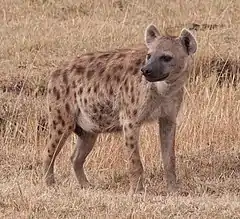гїена
Old Ruthenian

гѵє́на
Etymology
Borrowed from Ancient Greek ῠ̔́αινᾰ (húaina), reinforced by German Hyäne (from Early New High German hienna, from Old High German hijēna), in turn borrowed from Latin hyaena, which is also borrowed from Ancient Greek. Possibly partially inherited from Old East Slavic оуѥ́на (ujéna). Cognate with Russian гие́на (gijéna) (from Middle Russian иѥ́на (ijéna)) and Russian Church Slavonic гїена (giena). First attested in the 17th century.
Noun
гїе́на • (transliteration needed) f anim (genitive гѵєны, nominative plural гѵєны, genitive plural гѵєнъ)
Related terms
Old Ruthenian terms derived from the Proto-Indo-European root *suH- (0 c, 9 e)
Further reading
- Hrynchyshyn, D. H., editor (1999), “гиєна”, in Словник української мови XVI – I пол. XVII ст. [Dictionary of the Ukrainian Language: 16ᵗʰ – 1ˢᵗ half of 17ᵗʰ c.] (in Ukrainian), issue 6 (выпросити – головный), Lviv: KIUS, →ISBN, page 210
- Zhurawski, A. I., editor (1985), “гиена”, in Гістарычны слоўнік беларускай мовы [Historical Dictionary of the Belarusian Language] (in Belarusian), issue 6 (выостреный – глядати), Minsk: Navuka i tekhnika, page 280
This article is issued from Wiktionary. The text is licensed under Creative Commons - Attribution - Sharealike. Additional terms may apply for the media files.